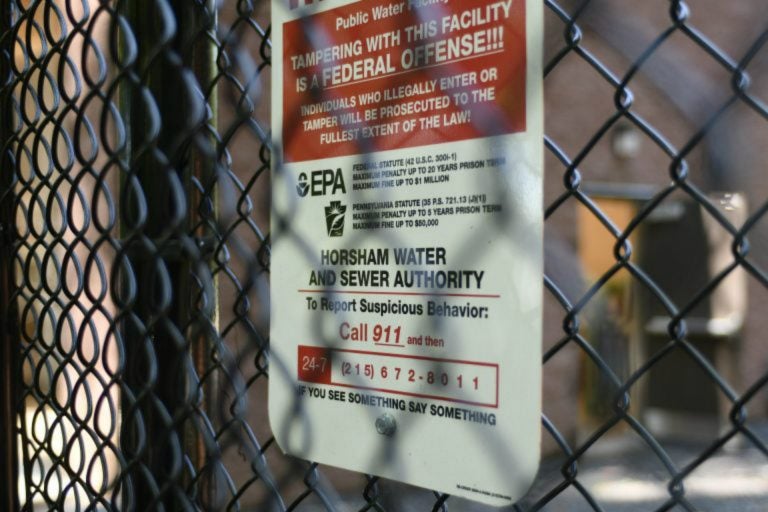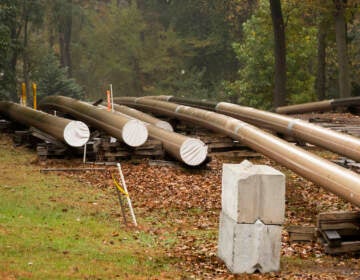Pa. testing finds elevated levels of PFAS in some drinking water
Pennsylvania regulators found varying levels of toxic heat- and water-resistant chemicals in drinking water supplies across the state.

Detailed view on the newly installed system to filter out PFAS Forever Chemicals at Well #2 of the Horsham Water and Sewer Authority facility in Horsham, Pa., on August 22, 2019. (Bastiaan Slabbers for WHYY)
This PennLive article appeared on StateImpact Pennsylvania.
—
Pennsylvania regulators found varying levels of toxic heat- and water-resistant chemicals in drinking water supplies across the state, including one significant exceedance in Centre County.
Earlier this year, the state Department of Environmental Protection began collecting samples of per- and polyfluoralkyl substances, known by the acronym PFAS, from water systems it deemed most vulnerable to contamination due to proximity to military and industrial sites. It released the first round of results Thursday.
The chemicals, found in everything from nonstick cookware to firefighting foam, are so dangerous because they don’t break down in the environment, disperse rapidly in water and accumulate in the human body over time. They’ve been linked to decreased fertility, high cholesterol, hormonal changes and increased cancer risk.
In 2016, the U.S. Environmental Protection Agency, set a health advisory of 70 parts per trillion (ppt) but there’s no formal enforcement behind that advisory level and researchers have found the chemical can be dangerous at much lower levels. New Jersey has proposed setting a state limit of 13 to 14 ppt. The European Food Safety Authority set a “tolerable intake value” of 6.5 ppt.
Drinking water systems don’t routinely test for PFAS but the administration of Gov. Tom Wolf has begun taking steps to regulate the chemical in the absence of federal action. The state DEP plans to test drinking water from 493 at-risk utilities. It is also mulling a state PFAS limit while developing policies for testing and remediation.
On Thursday, the administration released the first round of test results from 96 sample sites across the state. Of this batch, only one utility exceeded the EPA’s 70 ppt level.
That exceedance was discovered at State of the Art, an electrical equipment manufacturer in Centre County that oversees a private water supply used primarily by its roughly 110 employees. A message left with the company was not immediately returned Thursday.
DEP testing returned a combined PFAS level of 114 ppt.
According to the DEP, State of the Art already supplied bottled water to its employees due to unrelated water quality issues. The agency will work with the business to correct the problem.
Corrective actions generally involve additional filtration. For example, when a homeowner in the York County community of Newberry Township discovered elevated PFAS levels earlier this year, Suez added a new granular activated carbon treatment system.
None of the other 95 samples collected by the DEP in this first batch exceeded the EPA advisory level. Several, however, did exceed the more restrictive New Jersey proposal.
The most noteworthy of these include Suez Mechanicsburg, which serves 32,000 residents in Cumberland County not far from the historic Navy depot. DEP reported a combined PFAS level of 25 ppt.
In Schuylkill County, a test at the Frackville district of Pennsylvania American Water returned a combined PFAS level of 16.5 ppt.
WHYY is your source for fact-based, in-depth journalism and information. As a nonprofit organization, we rely on financial support from readers like you. Please give today.




